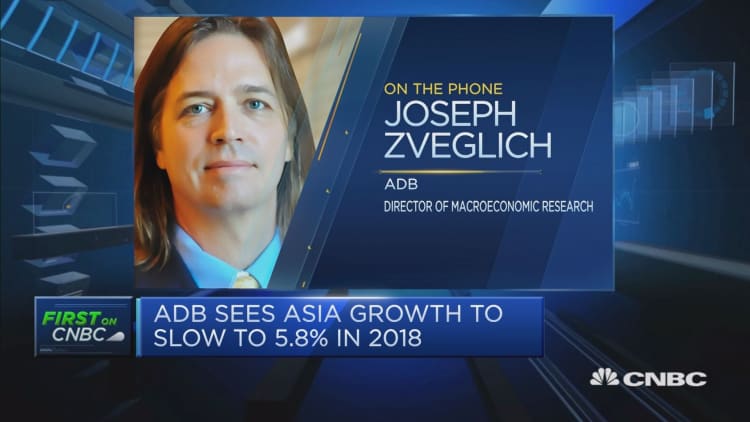
China's economy will expand a bit faster than expected this year on resilient consumption but growth will stutter in 2018, the Asian Development Bank said Wednesday.
Growth on the mainland is now expected at 6.8 percent in 2017, up from the previous forecast of 6.7 percent, the Asian Development Bank (ADB) said in its latest forecasts released on Wednesday.
Growth prospects in China for 2017 have been revised upward as spending by households has held up reasonably well. Still, persisting headwinds will weigh on economic impulses next year.
The world's second-largest economy is likely to grow by 6.4 percent in 2018 due to "controlled moderation" in the economy, Joseph Zveglich, ADB's macroeconomic research director told CNBC. That would mark the slowest pace of expansion since 1990, according to World Bank data.
The Chinese government is treading a thin line between deleveraging and keeping its debt-fueled economy humming.
Growth in the wider region will also be a bit better this year. Stronger-than-expected exports and domestic consumption likely lifted economic growth in developing Asia in 2017, the ADB said.
The upgraded outlook saw GDP growth in the region of developing Asia moving up 0.1 percentage point to 6 percent in 2017. The region includes 45 ADB members including China, Hong Kong, South Korea and Singapore, but excludes Japan.
The rosier prediction came after a year of uncertainty due to fears of trade protectionism.
There was "stronger-than-expected growth in most of our economies especially in terms of the pickup in trade," Zveglich said.
Growth for developing Asia next year is expected to be 5.8 percent.
Growth projections for the United States remain unchanged at 2.2 percent in 2017 and 2.4 percent in 2018.
And although the ADB is monitoring the North Korean nuclear crisis, there has been no economic spillover yet, he added.

